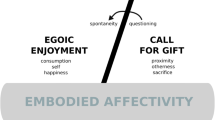Abstract
My discussion is concerned with how symbolic power constitutively structures our very identities in relation to one another and at the bodily level of lived experience. Although many accounts of the self and of subjectivity as socially situated have difficulties in their explanations of agency, Zaner’s work suggests a basis upon which the self’s independence from others can be understood. His phenomenology of embodied subjectivity explains how the emerging self presupposes presence with others. At the same time, however, “co-presence” also reveals the self’s distinct perspective and capacity for “circumstantial possibilizing,” that is to say, “actualizing another possible than the actual.” My aim is to examine critically the intersections between Zaner’s phenomenology and other theoretical accounts of the socially situated self. I also show how Zaner’s work contributes to these discussions a way of understanding the possibility of agency that is rooted in embodied experience.
Similar content being viewed by others
References
A Baier (1985) Postures of the Mind: Essays on Mind and Morals. University of Minnesota Press Minneapolis
A Baier (1995) Moral Prejudices: Essays on Ethics. Harvard University Press Cambridge, MA and London, UK
M. Bakhtin (1981) The Dialogic Imagination. University of Texas Press Austin
M. Bakhtin (1993) Towards a Philosophy of the Act. University of Texas Press Austin
D.C. Blake (1992) ArticleTitleThe Hospital Ethics Committee: Health Care’s Moral Conscience or White Elephant? Hastings Center Report 22 IssueID1 6–11
J. Bohman (1999) “Practical Reason and Cultural Constraint: Agency in Bourdieu’s Theory of Practice”. R. Shusterman (Eds) Bourdieu: A Critical Reader. Blackwell Publishing, Inc. Malden, MA 129–152
C.L. Bosk J. Frader (1998) “Institutional Ethics Committees: Sociological Oxymoron, Empirical Black Box”. R. Devries J. Subedi (Eds) BioEthics and Society: Constructing the Ethical Enterprise Prentice Hall Upper Saddle River, NJ 94–116
P. Bourdieu (1990) The Logic of Practice. Stanford University Press Stanford, CA
Bourdieu, P. Language & Symbolic Power. Edited by J.B. Thompson, translated by G. Raymond and M. Adamson. Cambridge, MA: Harvard University Press, 1991.
J. Bouveress (1999) “Rules, Dispositions, and the Habitus” R. Shusterman (Eds) Bourdieu: A Critical Reader. Blackwell Publishing, Inc. Malden, MA 45–63
J Butler (1997) The Psychic Life of Power: Theories in Subjection. Stanford University Press Stanford, CA
J Butler (1997) Excitable Speech: A Politics of the Performative. Routledge New York
J Butler (1999) “Performativity’s Social Magic”. R. Shusterman (Eds) Bourdieu: A Critical Reader. Blackwell Publishing, Inc. Malden, MA 113–128
A.L. Caplan (1982) ArticleTitleMechanics on Duty: the Limitations of a Technical Definition of Moral Expertise for Work in Applied Ethics Canadian Journal of Philosophy 8 (Suppl) 1–17
L Code (1987) Epistemic Responsibility. University Press of New England Hanover/London
L Code (1991) What Can She Know? Feminist Theory and the Construction of Knowledge. Cornell University Press Ithaca/London
Fultner, B. Rules in Context: A Critique of Kripke’s Interpretation of Wittgenstein. M.A. thesis, McGill University, 1989.
J Haaken (1998) Pillar of Salt: Gender, Memory, and the Perils of Looking Back. Rutgers University Press New Brunswick, NJ
I Hacking (1995) Rewriting the Soul: Multiple Personality and the Sciences of Memory. Princeton University Press Princeton
I Hacking (1999) The Social Construction of What? Harvard University Press Cambridge, MA
S Kripke (1972) Wittgenstein on Rules and Private Language. Harvard University Press Cambridge, MA
R.D Laing (1961) Self and Others. Random House, Inc. New York
R.D Laing (1969) The Divided Self. Penguin Books, Inc. New York
H. Longino (1993) “Essential Tensions–Phase Two: Feminist, Philosophical, and Social Studies of Science” L. Antony C. Witt (Eds) A Mind of One’s Own: Feminist Essays on Reason and Objectivity. Westview Press Boulder, CO 198–218
S Lovibond (1994) Realism and Imagination in Ethics. Basil Blackwell Oxford
R.A. McCormick (1984) ArticleTitleEthics Committees: Promise or Peril? Law, Medicine and Health Care 12 IssueID4 150–155
M. Merleau-Ponty (1964) The Phenomenology of Perception Routledge London
S. M. Park (1997) ArticleTitleFalse Memory Syndrome: A Feminist Philosophical Approach Hypatia 12 IssueID2 1–51
C. Prozan (Eds) (1997) Construction and Reconstruction of Memory: Dilemmas of Childhood Sexual Abuse. Jason Aronson Northvale, NJ
C. Taylor (1985) “Theories of Meaning”. In Human Agency and Language Cambridge University Press New York 248–292
C Taylor (1999) “To Follow a Rule. . . ” R. Shusterman (Eds) Bourdieu: A Critical Reader. Blackwell Publishing, Inc. Malden, MA. 29–44
D. Tietjens-Meyers (Eds) (1997) Feminists Rethink the Self. Westview Press Boulder, CO
L. Wittgenstein (1973) Philosophical Investigations. Basil Blackwell Oxford, UK
R.M Zaner (1967) The Problem of Embodiment: Some Contributions to a Phenomenology of the Body. Martinus Nijhoff The Hague
R.M. Zaner (1990) ArticleTitleMedicine and Dialogue The Journal of Medicine & Philosophy 15 IssueID3 303–325
R.M. Zaner B.D. White (1993) ArticleTitleClinical Ethics Training for Staff Physicians: Designing and Evaluating a Model Program The Journal of Clinical Ethics 4 IssueID3 229–235
R.M. Zaner (1996) ArticleTitleListening or Telling? Thoughts on Responsibility in Clinical Ethics Consultation Theoretical Medicine 17 255–277
R.M. Zaner (1999) ArticleTitleAfterword Human Studies 22 99–116
R.M. Zaner (2002) ArticleTitleMaking Music Together While Growing Older: Further Reflections on Intersubjectivity Human Studies 25 1–18
Author information
Authors and Affiliations
Corresponding author
Rights and permissions
About this article
Cite this article
Jaeger, S.M. Ethical Reasoning And The Embodied, Socially Situated Subject. Theor Med Bioeth 26, 55–72 (2005). https://doi.org/10.1007/s11017-004-4804-4
Issue Date:
DOI: https://doi.org/10.1007/s11017-004-4804-4




